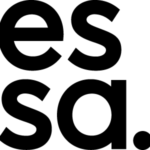We celebrate the good, the bad, and the merry
It has been one year since the European Software Skills Alliance (ESSA) project launched. The mission is clear: We want to skill, upskill, and reskill individuals into professional software roles in Europe. In this 2021 retrospective, we revisit the good, the bad, and the merry of a successful (yet challenging) year.
Leading the way to a solid Software Skills Strategy
We met every month with all the partners — a lovely, professional bunch of people. Touching base with everyone regularly (even online) is key to success with a large partnership. In total, we almost spent two full continuous days in meetings together(!) and that surely helped us to get to know each other and deliver high-quality results.
In 2021, the Irish Computer Society (Ireland) and the Chamber of Commerce and Industry of Slovenia led the in-depth analysis of the software sector to identify the software roles and skills that are the most needed now and in the future. On this basis, we designed a strategy, that includes innovative elements, to bridge the skills gaps and suggest educational profiles to train individuals for professional software roles.
Our Needs Analysis confirms that profession-related skills like (agile) project management, security, sustainability, and ethical awareness are important for software professionals. But even more important are soft skills like teamwork, communication, critical thinking, problem-solving, and self-management.
Organisations need software professionals that can work in multidisciplinary teams, so they are looking for so-called T-shaped and especially π-shaped professionals — basically, individuals that have broad training and are specialised in software, but also another field.
We also found out that partnerships between organisations with software skills needs and learning providers should be strengthened and that time for training in organisations is often limited. This is an urgent call for more flexible modular programmes and micro-credentials.
Strategies to skill, upskill, and reskill individuals into software roles
How to educate for software roles? What specific training can we deploy or build on? How to validate competences and skills? You will find answers to all these questions in the Software Skills Strategy — which will be officially released on 10 February at our launch event (sign up!).
The document presents straightforward statements on training, educating, and validating like “focus on certifications based on the principles of micro-credentialling, using digital badges and on accreditation standards for educational programmes”. These are strategical insights for policymakers but also organisations with software skills needs and learning providers to improve practices and more efficiently skill, upskill, and reskill individuals into software roles. They will also be the basis to develop “educational profiles” for Vocational Education and Training (VET) and higher VET curricula in 2022.
We also wanted to bring forward real-life good practices’ examples on digital badges, soft skills training, SCRUM in education and more! We collected regional, national, and international case studies from the academic and non-academic sides to highlight these innovative learning content and new ways of delivery and inspire others to replicate or adapt them. Stay tuned as all these best practices will be packaged and freely available in our Resource Centre in January.
Now, you can wonder how we will make sure that the strategy is up-to-date? We will review it annually following what we called our “Strategy Review Process”. It will involve experts from the ICT field; we will take the pulse of the software sector by capturing their views via national and European focus groups and look into relevant databases and reports. All in all, this process will continue in the long term, so we can adapt and find solutions to the relevant needs.
We are ready for it! Are you?
Our website is currently the to-go place to find relevant and up-to-date info on our project. From 2022 onward, it will grow as a knowledge base and community… We can’t wait to tell you more! Of course, you can also keep yourself informed via our socials or our newsletter — a summary of the novelties, free resources, and a curated list of events and interesting reads.
Last monthly meeting, we celebrated our past achievements with partners, but we also had the opportunity to launch together the next BIG work package led by our colleagues from Global Knowledge France, Global Knowledge Netherlands, and ASIIN. This new strand of work will focus on the development of VET curricula, a certification framework, and a mobility programme.
We are looking forward to continuing our work and launching the Software Skills Strategy on 10 February! We are always welcoming new associated partners and organisations that want to get involved in our activities — get in touch with us.

